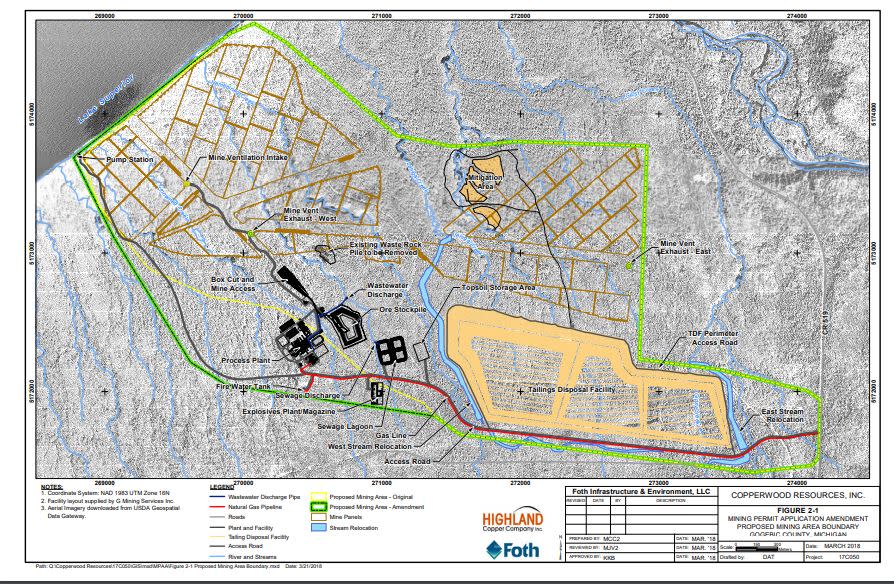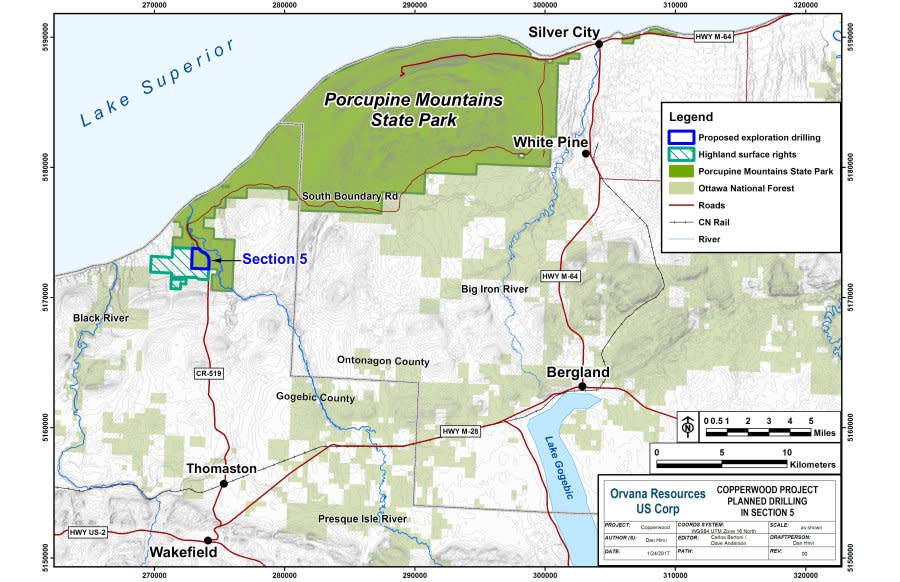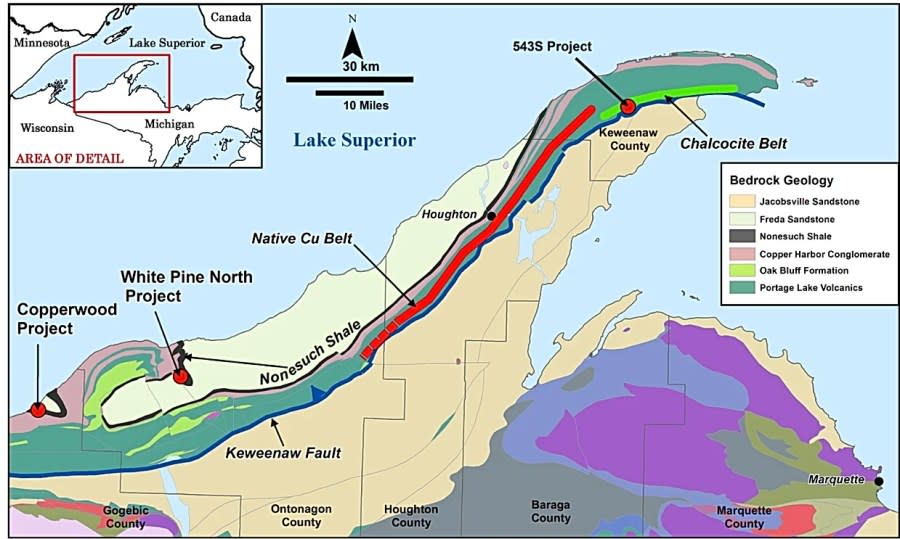State approves $50M funding for Copperwood Mine project, with strings attached
LANSING, Mich. (WJMN) — A Canadian company working to develop a copper mine in Gogebic County cleared a large hurdle Tuesday, receiving a unanimous vote from a state funding board to secure $50 million for its Copperwood Mine project.
The grant will enable a host of infrastructure upgrades for the area, allowing for a bolstering of the power grid, roads, and internet capabilities. The total cost of developing the mine is expected to fall just under $400 million, according to Highland Copper’s summary of the project.
Proposed U.P. mine hits roadblock for $50M grant over financing questions
The Copperwood Mine project is located west of Porcupine Mountains Wilderness State Park and just miles from the shore of Lake Superior. Geological interest in the area goes back to at least the 1950s, with interest being renewed in 2008 and Highland Copper’s involvement beginning in 2017.
Highland Copper estimates 380 jobs will be created on-site when the mine is operational, with another 313 indirect jobs being created throughout the state. The company says pay for those jobs will range from $80,000 to $120,000.
The company also expects its operations will generate $12 million in local, county and state taxes every year.
Tuesday’s affirmative vote comes after a nearly two-month delay from when the Copperwood proposal was first heard by the MSF board, where some members raised questions about the project’s viability.
Schematic from Highland Copper’s amended mining application Map+-+Copperwood_1486409100547.jpg Courtesy: Highland Copper Company Inc.
One result of the delay was a set of conditions for the money. Cindy Warner, chair of the MSF’s Policy and Planning Subcommittee, described how the terms of the agreement had changed since the grant was first proposed. “The term sheet now reads that the company now has to go out and get funding before it gets a dime from the state. In addition, for clarification, the $50 million that has been referred to is for infrastructure improvements and we wanted to make sure that was well called-out and delineated.”
DEQ, Copperwood Resources reach settlement addressing springtime erosion incident
Warner added that those funds will be reimbursed, not paid for up-front. “The changes that were made substantially improve this organization’s ability to prove that it not only has the financial standing, but also that they are only getting reimbursed for activities that will benefit this region for decades to come,” said Warner.
According to the proposal, Highland Copper would have to secure $150 million in funding by the end of 2025.
Concerns about Highland Copper’s ability to fund the lion’s share of the project are also reflected by its own staff. A financial statement published at the end of 2023 says Highland Copper is “subject to a number of risks and uncertainties associated with its future exploration and development activities.”
The financial statement goes on to state that the company has not yet made more money than it has spent, sporting a $43 million deficit and holding $21 million of working capital at the end of last year. The author says that means Highland Copper needs some form of outside investment to continue its operations, and while it hasn’t had a problem with it in the past, “if management is unable to obtain adequate funding, the Company may be unable to continue its operations.”
The proposed copper mine, if created, will be a below-ground operation with above-ground processing and waste storage facilities, occupying 505 acres.
The plan for the proposed Copperwood Mine is to operate for 11 years and extract 54 million ore tonnes, which are estimated to be about 1.51% copper. Highland Copper has also stated that it is exploring the option of extending the life of the mine to extract what is believed to be another 79 million ore tonnes of copper that is about 1.09% pure.
Highland Copper is also planning to create an offsite wetland preservation area that would cover over 700 acres.
A dozen local municipalities passed resolutions in favor of the grant, including Wakefield Township and Gogebic County which has the project within its boundaries.
Ahead of the board’s vote, Wakefield Township Supervisor Mandy Lake welcomed the prospect of making it easier for children in the community to find good jobs close to home. “We’ve lost so many people because if they wanted a good job, they had to leave.”
Willie DuPont, the Ontonagon Village Manager agreed, saying “I’ve seen nothing but young people leaving.”
State legislators from the U.P. Ed McBroom and Greg Markkanen also gave their thumbs-up to the project.
At a press conference after the vote, McBroom said “as you know, I’ve been born and raised in the Upper Peninsula. Right now I’m the only state legislator who can say that, and natural-resource-based economies have made Michigan a prosperous state for well over a hundred years… Times have changed, and yet we see people like myself and others who have long persisted that there remain tremendous opportunities here.”
Still, several community members and concerned citizens voiced opposition to the grant.
Jeff Plumber, a longtime U.P. resident said “this is really an ‘all-risk no-reward situation’ in the long run, and I really can’t believe anyone would risk this amazing area which is vital to both Michigan’s ecological and environmental health, to enrich a foreign company with our Michigan taxpayer money… The unsustainable boom-and-bust nature of mining might bring very short-term economic gain, but it will surely leave the western U.P. with a legacy of pollution and ecological destruction.”
Ben Seguin, a retired federal employee and environmentalist, pushed back on the economic benefit of the mines, saying “if mining is so great for the U.P., then why is the economy in the U.P. in such dire straits? There has been mining in the U.P. for centuries… The mines come and go, and leave toxic waste, economic depression… why give corporate welfare to a foreign company, to the tune of $50 million for a project that will come and go, and leave the U. P. worse off than it is now?”
After the MSF gave the grant the green light, Highland Copper CEO Barry O’Shea said he listened respectfully to all public comments shared. “We understand with this grant comes significant responsibility to the local environment and the local community, and we take that very seriously.”
O’Shea addressed criticisms about the project’s potential ecological threat to the nearby state park and Lake Superior. “I want to say that mining has existed with tourism for decades… Copperwood is an underground mine which minimizes surface impact, and I want to be very clear that this is not an acid-generating mine… we listened to community concerns in 2023 and will not be drawing water from Lake Superior.”
The Wakefield Township Supervisor said “both of my kids attend the Wakefield/Marenisco school district here… We often walk the hallways in the school and the kids are always amazed at the graduating class pictures on the wall.” Lake said her son’s class size is 20, and that there are only 10 kids in her younger daughter’s class. She said they ask her why there are so many students in the pictures back then. “Someday I hope that my kids can walk down the school hallway again and say ‘boy these graduation classes really got bigger since when we graduated.’”
Some preparation of the land is already underway, including the diversion of two streams. O’Shea said his company’s goal is to begin construction on the facilities in the spring of 2025 and begin operating the mine in 2-3 years.
For the latest news, weather, sports, and streaming video, head to WJMN - UPMatters.com.



